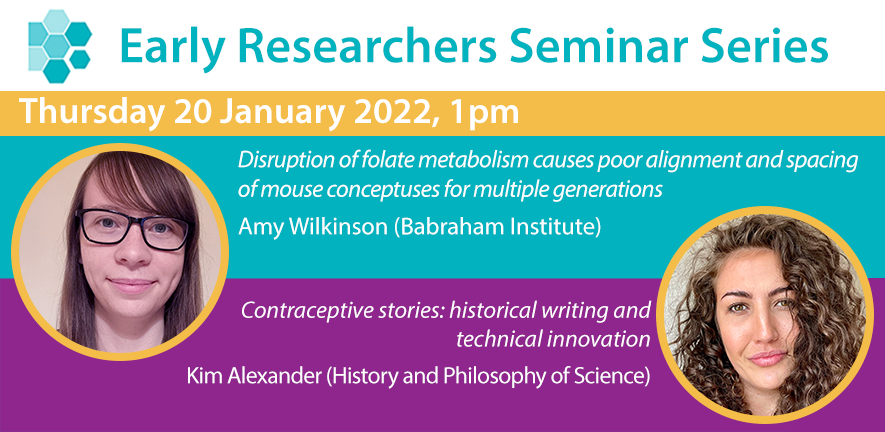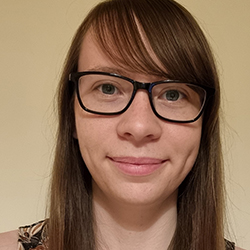
Thursday 20 January 2022, 1pm - 2pm
Disruption of folate metabolism causes poor alignment and spacing of mouse conceptuses for multiple generations
Amy Wilkinson (Babraham Institute)
Contraceptive stories: historical writing and technical innovation
Kim Alexander (History and Philosophy of Science)
Chair: Aideen O'Shaughnessy (Sociology)
Meeting link
The Zoom meeting details can be found on this page (Cam only; Raven login needed): https://www.repro.cam.ac.uk/erss-2021-22-zoom-meeting-details. If you don't have a Raven login, please email Christina Rozeik to receive the Zoom meeting link for this year's seminars.
Speakers and abstracts
Disruption of folate metabolism causes poor alignment and spacing of mouse conceptuses for multiple generations
Amy Wilkinson (Babraham Institute)
Abnormal uptake or metabolism of the vitamin folate is associated with a range of pregnancy complications. However, the molecular role of folate in pregnancy is unclear. Using mice with the hypomorphic Mtrrgt mutation, we explore how defective folate metabolism influences early development and pregnancy establishment. Mtrrgt/gt mice were previously shown to display an array of phenotypes at midgestation (embryonic day (E) 10.5) including developmental delay, congenital abnormalities, and placenta defects. Now, we show that these defects are apparent as early as E8.5. Notably, we also observe twinning and misalignment of some Mtrrgt conceptuses within their implantation sites from E6.5, implicating folate metabolism in blastocyst orientation and spacing at implantation. The degree of misorientation occurs across a continuum, with severe conceptus skewing associating with developmental delay and heart malformations. This highlights potential consequences of misorientation for later development. Interestingly, litters of wildtype Mtrr+/+ mothers also exhibit misorientation. Genetic pedigree analysis reveals multigenerational inheritance of this phenotype through the maternal grandparental line, persisting for at least four wildtype generations. Previous studies emphasise the role of the uterus in guiding conceptus alignment. However, a range of decidual parameters at E6.5 are not associated with conceptus misalignment in the Mtrrgt model. Moreover, severe conceptus skewing remains after embryo transfer into a normal uterine environment, indicating misalignment is independent of the peri- and post-implantation uterus. Instead, it is likely attributed to an embryonic mechanism. Our data casts light on the complex role of folate metabolism during development beyond a direct maternal effect.
About Amy Wilkinson: I am a Research Assistant in the Rugg-Gunn and Reik groups in the Epigenetics department of the Babraham Institute. My current research explores the use of human pluripotent stem cells to study amnion development and function. I completed my BA in Natural Sciences at the University of Cambridge, carrying out my undergraduate project with Dr Erica Watson. Here, I investigated the effect of abnormal folate metabolism on uterine function and placental development.
Contraceptive stories: historical writing and technical innovation
Kim Alexander (History and Philosophy of Science)
History plays an unusually clear role in present thinking about contraception. The distinction between ‘traditional’ and ‘modern’ contraceptives is fundamental to global family planning policy, while, in the West, the recent ‘digital turn’ in contraceptive development is deciphered by health chiefs, journalists and academics alike. Within the history of reproduction, contraceptive histories have provided a dominant framework for the negotiation of progress and innovation. Yet, despite this significance to policy, practice and scholarship, histories of contraception have not received significant academic attention.
My PhD offers the first sustained analysis of the role of historical narratives within histories of contraception. Through published, broadcast and archival sources, I aim to demonstrate the extent and effect to which history has been used in the promotion and rejection of contraceptive technologies, the negotiation of technological innovation, and the foregrounding of contraception to the reading and writing of the history of reproduction. I will focus on Britain and North America, and expect to chart key shifts from 1920-1980. These will include the histories and debates spearheaded by Marie Stopes and Margaret Sanger, Norman E. Himes, the Princeton Office for Population Research, the Catholic Church and the Women’s Health Movement. I will close with a discussion of the ways these historical narratives continue to pervade our experiences and expectations of contraception today.
About Kim Alexander: I am a first year PhD student at the department of History and Philosophy of Science here in Cambridge. I have long been fascinated by reproductive health, and my research interests focus on reproductive technologies, perceptions of fertility and gendered experiences of health care. During my MSci (also in the HPS department) I developed an interest in the historiography of medicine and technology and began to consider the underexplored role of history in reproduction. Under the supervision of Prof. Nick Hopwood, my PhD aims to construct the first sustained historiography of contraception. In recovering this strand of the history of histories of reproduction, I hope to shed light on the significance of history in negotiating technological innovation and highlight its practical importance in decisions about birth control.
The Early Researchers Seminar Series (ERSS) is a platform for PhD Students and early career researchers (ECRs) at the University of Cambridge with research foci on reproduction to share and discuss their research with other academics from a range of disciplines also researching reproduction at the University. Seminars are held on Zoom on the thirdThursday of every month, 1pm - 2pm. For more information, and for the full 2021 - 2022 programme, please see the main ERSS page.



